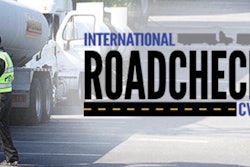
$18 million per day.
That's what cargo theft costs the U.S. trucking industry, and the nation's economy.
The latest research from the American Transportation Research Institute (ATRI) released today provides insights into the growing plague of cargo thefts, and offers suggestions on how to stem this $6.6 billion problem, including the role of drivers play in theft prevention.
ATRI's study includes case studies to document the high cost of theft to both motor carriers. who average more than $520,000 in annual theft losses, and to logistics services providers, who average more than $1.84 million in annual losses.
One of the strategies ATRI suggests for combatting cargo theft is to create what it calls a "security culture" across the supply chain. That includes increased training for drivers and other employees.
"Research participants strongly emphasized that numerous vulnerabilities and weaknesses exist at multiple points across the supply chain," said ATRI. "This has made cargo theft easier for criminals, and more difficult for victims to detect and thwart."
ATRI said vulnerabilities include a lack of security training for drivers, a lack of knowledge about cargo security within the departments of carriers, and "generally too much complacency within companies."
To address those issues, ATRI suggests carriers:
Train drivers in theft prevention and situational awareness
Promote awareness and accountability to all staff
Provide support for driver vigilance (tools for verifying authenticity of documents and reporting suspicious activity)
Create a company-wide security mindset or “security culture” across the supply chain
And to create that "security culture" within companies, the study suggests:
Leadership-driven support of and investment in security
The involvement of all employees in cargo theft awareness and security training
A clear set of policies, personnel expectations, and accountability
The encouragement of all employees to report potential security issues proactively
ATRI also suggests enacting model state legislation, including specific cargo theft penalties, and creating a federal-level centralized cargo theft reporting agency.
The study concludes " there is little interest within the judicial system for prosecuting cargo theft, and that current cargo theft penalties are insufficient. Additionally, participants suggested that law enforcement’s capacity to combat cargo theft is often limited."
“Unfortunately, we’ve reached a point where cargo theft has become a standard cost of doing business for trucking companies, with consumers ultimately footing the bill for many billions of dollars in losses. Something must be done to stop these costly crimes,” said Ben Banks, TCW, Inc. president.
Among the data collected by ATRI shows:
65.3 percent of motor carriers surveyed had experienced cargo theft in 2023 or prior o 43.2 percent in the past year (2023)
100 percent of logistics services providers (LSPs)surveyed had cargo stolen in 2023
Motor carriers regularly fall victim to all kinds of theft, including pilferage (39.9% of incidents) straight theft (31.5% of incidents), strategic thefts (20.3% of incidents
For LSPs, strategic theft was the greatest concern, representing 62.5% of incidents
Food was the most frequently stolen category of cargo, followed by electronics, automotive and beverages
California was at the top of the list of states where thefts occur for motor carriers and LSPs; Illinois, Texas, Georgia, Florida and Tennessee rounded out the list of top states
The average annual value of cargo stolen was: $521,135 for motor carriers and $1,838,160 for LSPs
The average loss per cargo theft Incident was $29,108 for motor carriers and $95,351 for LSPs
Estimated annual direct and indirect costs of thefts from motor carriers is between $1.83 billion to $6.56 billion
Estimated direct and indirect costs of thefts from motor carriers per day is nearly $18 million
The majority of cargo stolen from motor carriers (73.5%) is never seen again
The full report is available on ATRI's website here.








